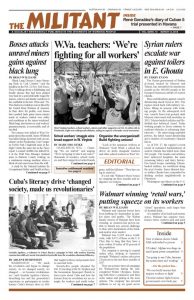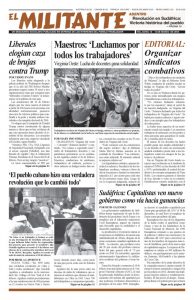Below is an excerpt from Marianas in Combat; the Spanish edition is one of Pathfinder’s Books of the Month for March. In it Teté Puebla tells her story to Mary-Alice Waters, president of Pathfinder Press. Puebla joined Cuba’s revolutionary struggle at the age of 15. Her experiences span more than half a century from clandestine action in the cities, to serving as an officer in the victorious Rebel Army’s first all-women’s platoon, to becoming the highest-ranking woman in Cuba’s Revolutionary Armed Forces. Copyright © 2003 by Pathfinder Press. Reprinted by permission.
WATERS: Fidel [Castro] has often said that as difficult as it was to overthrow the Batista regime, the much bigger challenges began after January 1, 1959. The Rebel Army and July 26 Movement had to lead working people to take the political power they had won, to transform social relations from top to bottom, and to defend the revolution from attack by the U.S. ruling class and its government.
What new tasks did you find yourself responsible for after the revolution’s triumph?
PUEBLA: On January 8, 1959, as we were heading to our homes, thinking of catching a few days’ rest, the commander said to me: “You’re going to tend to Oriente province,” to head up the Department of Assistance to War Victims and Their Families, which was led by the Rebel Army in the area. We had to deal with all those affected by all the dictatorship’s crimes, the burned-down houses, the destruction from the offensives waged in the eastern region. The new department’s slogan was, “In the face of pain, the homeland makes no distinction. To save a child is to build the homeland.”
So in early 1959 I went to Oriente province, to see to the victims of the war and their families. We worked very closely with Celia [Sanchéz] and Fidel on this. The work began on February 4 that year.
This was very satisfying work. Of all the things I’ve done in my life, this is one I’m proudest of: helping all these people.
Taking care of the victims of war was a tradition of ours going back to the days of the Sierra Maestra.
An example is the case of Eutimio Guerra, a peasant who joined the struggle and helped in the early days. But he turned traitor and sold out to the dictatorship’s army for money. His assignment was to kill Fidel, but he was discovered and executed. Afterward we took care of his family. They were given 50 pesos a month, even though our guerrilla column had no money. And we gave them a cow, so his children would be fed. His widow and four children became fully incorporated into the revolutionary process.
So in Oriente our starting point was to take care of all the victims of the war. We addressed everything the Batista government had destroyed.
Sometimes you’d care for a peasant child whose mother and father had been murdered, whose house had been burned down. And since our army is an army of the people, we rebuilt all those houses that Batista’s army had burned down. We took in all these families because they’d had their land taken away, they’d lost their jobs, they’d suffered every kind of abuse.
The Masferreristas — the ones I referred to earlier who would put people in a sack, pour gasoline on them, and burn them alive — those perverted assassins were in all the eastern zones, and they devastated towns.
But the families of these murderers were provided for. Their children were provided for the same as the children of the rebels. That’s why with all truthfulness we can say our revolution is so great and humane. Although we had no money, we provided their children with the same care and the same schools that we provided to the rebels’ children. The children, the mothers, the widows weren’t to blame for the murders the army of the dictatorship committed. So we looked after them in the same way. Batista soldiers’ widows along with rebel fighters’ widows attended schools for adults. …
Among the people there was a great deal of hatred for the murderers of Batista’s army, and everyone knew who the killers were. So whenever we set up a school with a group of children, we didn’t say who their parents were. Only those of us in charge of them knew. We protected these children in this way. At present those boys and girls are doctors, engineers, university graduates. They’re part of the revolution. There are eighteen war orphans that are like my own children to me, and their children are like my grandchildren.
The widows and mothers of members of the Batista army collect a pension, and that’s been true throughout the 43 years of our revolutionary process.
This is a characteristic of the revolution. It’s called humanity. Love for one’s fellow human being. Love for the family, for the people, for countries that suffer injustice. We identify with all peoples of the world who fight against misery and hunger. We feel the same way for the hundreds of millions of abandoned children in the world who live in the streets looking for the means to subsist on. There are no such children here in Cuba. Because even back then in those penniless times, this revolution was capable of sheltering everyone, of taking these children off the streets. If the revolution didn’t have these qualities, it would no longer exist. This began with Fidel. These principles of the revolution are the moral foundation of our struggle. …
In April 1966 I was transferred to the general staff and served in a special unit led by Sergio del Valle to attend to the needs of the families of those who had left to fulfill internationalist missions.
So I’ve been doing this since the first Cuban volunteers left for Algeria, for the Congo, Vietnam, Angola, Ethiopia, everywhere. I’ve been helping all their families, so they wouldn’t have to worry about any situation that might arise. Later on, I also oversaw the care of all the physically disabled who served on internationalist missions.
When we go to these countries, we don’t take their wealth or resources home with us. The only material thing we bring back to Cuba is our dead. The compañeros who fell fulfilling internationalist missions didn’t die in vain. They died for the revolution, to defend the principles of our revolution, aiding movements that had requested our help in different parts of the world.

